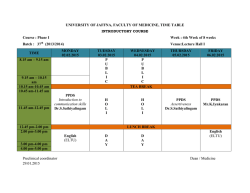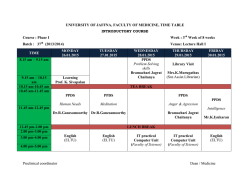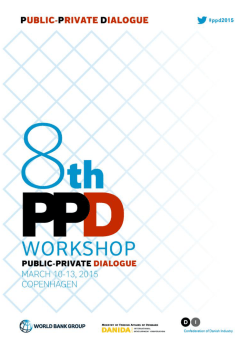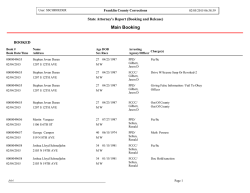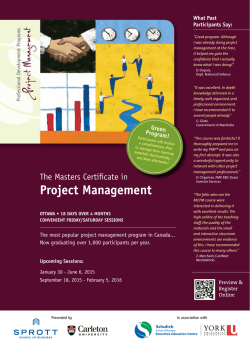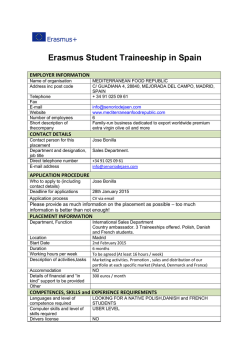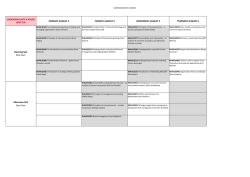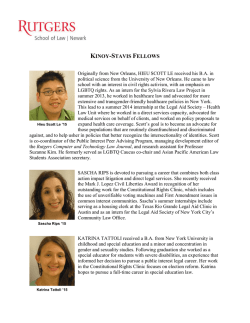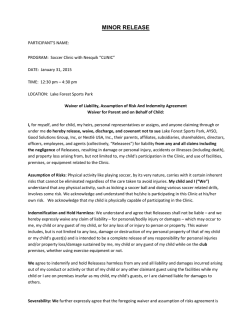
PROGRAMME Technical days - Public Private Dialogue
PROGRAMME Technical days 1 PPD TECHNICAL DAYS DAY 2 - Wednesday March 11, 2015 Introduction to day 2 Cecilia Sager, Practice Manager, Competitive Sectors, World Bank Group Lessons from mobilizing business leaders to help shape and implement public policy Benjamin Herzberg, Program Lead, World Bank Group 08:45 – 09.45 The private sector faces significant adaptation challenges, and whether countries succeed at adaptation will depend on how well private actors are prepared. The session will discuss the role of the private sector in adaptation and highlight what contributions PPDs can make in areas such as sustainable urbanization, food sector transformation, financing for green growth, subsidies distorting markets, water resources management, green public procurement and innovation etc. The presenter will discuss how PPDs are implemented in the field: what, when, and for what benefits, what are the risks, how can they be mitigated and how can dialogue be sustained and how to build an advocacy platform. Collaborative leadership for developmental impact Mil Niepold, President, The Mara Partners 09:45 – 10:30 10:30 – 11:00 This session looks at how PPD can be used to address larger social and political issues as these affects the bottom line of companies. Drawing from experiences with governments, social actors and Fortune 500 companies, Mil Niepold will discuss how multi-stakeholder engagements have helped address issues such as women in the workplace, child labor in value chains, and natural resource and land use management. Frameworks will be offered on managing the dynamics of these mechanisms, understanding key factors for consideration and agreeing on outcomes. Coffee Break The How To’s of PPD program management “French Café” discussion on Practical Steps and Processes for an Efficient PPD Anna Nadgrodkiewicz, Director, Multiregional Programs, Center for International Private Enterprise (CIPE) 11:00 – 11:45 The interactive session is dedicated to tools and techniques to help a PPD coordination function well. It will provide opportunities for each PPD representative present to discuss their own challenges, and how to address these and understand the various aspects of running an efficient coordination. A circle of PPD coordinators / program managers will discuss the issues faced by PPD coordination units and share implementation tips. A series of questions will be put forward to guide the discussion. Case studies: From Knowledge to Practice 11:45 – 13:00 Each session explores a particular topic, with three 15-minute case studies (7 slides each) presented by practitioners attending the event. Each session is moderated by a PPD specialist, who will summarize the key findings and present a 5-point checklist on the topic in the Plenary. 2 1 - PPD in Fragile and Conflict-affected States 2 - City-Level PPDs and Growth Poles 3 - PPD for social dialogue Steve Utterwulghe Megha Muki Syed Akhtar Mahmood Senior Private Sector Development Specialist, Global Lead, PPD, WBG Economist, Trade & Competitiveness, WBG Lead Investment Policy Officer Global Lead, Transparency, Accountability and Dialogue, WBG Introduction Case study 1: TBC Case study 2: TBC Case study 3: TBC Introduction Case study 4: Tajikistan Case study 5: Uganda (DI) Case study 6: Ghana Introduction Case Study 7: Slovak Republic Case study 8: TBC Case study 9: TBC 13:00 – 14:00 Lunch 14:00 – 14:30 5-Point checklists on key PPD topics Moderators from the case studies sessions will present a framework regarding the three key topics including the findings of the case studies presented in their sessions. Managing inclusive industrial development through public-private dialogue - Site visit of Danish companies and institutions - Speed-writing of case studies and speed-preparation of PPD expo The group will split in four sub-groups, each group will visit a different company or institution which has implemented a green growth strategy through public-private dialogue. Each team will collect information/materials and work as a group to write a short case study and produce an exhibition booth about the case, including pictures, write-ups, videos, props, etc. The exhibit will be prepared during an evening buffet dinner and working session, and be presented to the entire group in a PPD Expo which will take place the next day. 14:30 – 15:00 : Introduction to the events and tasks of the day 15:00 – 18:00 : Field visits 14:30 – 21:30 1. 2. 3. 4. Carlsberg Group: using collaboration to develop circular economy Chr. Hansen: Enhancing Sustainable Sourcing and Inclusive Supply Chain through PPD The State of Green: Business and Government partnering for green economy Copenhagen municipality: PPD for Sustainable City Development 18:00 : End of field visit 18:30 : Arrival at Danish Industry Conference Center 19:00 – 21:30 : Group PPD Expo preparation Buffet Dinner available throughout Team will be able to work on the production of their booth. Teams will have to self-distribute tasks for writing the lessons learned brochure/short-case study, and produce exhibition material such as panels with write-ups, illustrations, diagrams and pictures, videos to be displayed during the exhibition, etc. Arts and craft materials will be available for teams, as well as video editing and color printing capability. 21:30 Adjourn 3 DAY 3 - Thursday March 12, 2015 “The PPD Expo” Each group will designate a 3-person “Booth advanced set-up team” which will arrive at the Danish Industry Conference Center at 08:00 AM to set up their respective PPD Expo booth. 08:45 – 9:45 Four booths will be set up to exhibit the findings of the site visits from the previous day. Each Booth will be manned by members of the groups having performed the site visits. The booths will present information and lessons including a 2-page brochure, pictures, write-ups, videos, props, etc., all produced by the teams the night before. Representatives of each visited sites will also be present to roam through the exhibit. Applicability of “PPD Expo”: Knowledge Exchange and Community of Practice Malcolm Toland, PPD expert Debriefing session with feedback from participants 09:45 – 10:30 Syed Akhtar Mahmood, Global Lead, Transparency, Accountability and Dialogue, WBG Capacity Building and systemic change through South-South Exchange Anna Nadgrodkiewicz, Director, Multiregional Programs, CIPE Online knowledge exchange platform and community of Practice 10:30 – 11:00 Coffee Break Monitoring & Evaluation in PPDs: The “Public-Private Dialogue Country Profile” Hanna-Mari Kilpelainen, OECD-UNDP Joint Secretariat Team 11:00 – 12:30 The Global Partnership for Development Cooperation and Aid Effectiveness has developed a new global indicator to measure the participation of the private sector in the design and implementation of development policies and strategies to foster sustainable growth and poverty reduction. This new framework is based on the existing PPD M&E tools that have been developed by the PPD Community of Practice. The “Public-Private Dialogue Country Profile” is composed of 3 sub-indicators. For a given country, the review focuses on a specific agreed upon dialogue platform and looks at the country-level context for public-private dialogue following a standard methodology using three tools: a. Legal and regulatory context for PPD (a series of existing governance-related indicators) b. Country’s readiness to host, create or sustain a dialogue process (PPD Diamond) c. Organizational effectiveness of a given platform (PPD evaluation wheel) Participants will partake in an interactive exercise to create a PPD profile on the spot (Participants are asked to bring their laptop for this session). 12:30 – 13:30 Lunch Training session: Ensuring sustainability of business associations Training team from the Confederation of Danish Industry 13:30 – 15:00 The Confederation of Danish Industry (DI) will discuss the role of business associations in advancing the sustainability and inclusion agenda. It will also share its experience in building 4 business associations and common challenges faced by these organizations in sustaining themselves. The viability of advocacy and business development services is crucial to the effectiveness of the dialogue process. DI will provide tools to assess the viability of partnerships and point at some resources to strengthen the associations involved in PPDs. 15:00 – 15:30 Coffee Break PPD Master Class: Joint elaboration of on-the-spot solutions for country cases Training team from the Confederation of Danish Industry This session will call the audience to help design a particular solution to a particular sustainability problem faced by 3 different PPDs. Approaches to strengthening local ownership will be addressed collaboratively by the entire group, through case studies presented by practitioners. 15:30 – 17:00 Each of the 3 representatives will present their PPD (2 slides), explain the sustainability challenges (2 slides) and present their sustainability action plan (2 slides), in 10 minutes. The public will then interact with the representative for 15 minutes with the objective to improve the plan. Case study: Bangladesh Textile Industry (10 minutes) – Master class discussion (15 minutes) Case study 11: Kenya Private Sector Alliance (10 minutes) - Master class discussion (15 minutes) Case study 12 (10 minutes) - Master class discussion (15 minutes) Conclusion from moderator, presentation sustainability typology (15 minutes) The PPD Howards Karsten Dybvad, CEO, Confederation of Danish Industry Established in 2006, the PPD Community of Practice instituted its own recognition awards in 2014. The “PPD Howards” are named after our late World Bank colleague and friend Nicholas C. Howard, who dedicated his professional life to advance the collaborative governance agenda. 17:00 – 17:30 Three “PPD Howards” will be awarded to local PPD initiatives to honor the virtues of qualities which are critical to successful PPDs: 1) Long-standing achievements 2) Resilience 3) Innovation Concluding remarks on next steps 17:30 – 18:00 Karsten Dybvad, CEO, Confederation of Danish Industry Martin Bille Hermann, State Secretary For Development Policy, Ministry of Foreign Affairs of Denmark Benjamin Herzberg, Program Lead, Open Private Sector, World Bank Group Attendance certificates 5 DAY 4 - Friday March 13, 2015 Private Guided Visit of the Danish Parliament, Christiansborg Castle 10:00 – 12:00 12:00 – 13:00 Discussion with the Speaker of the Parliament on the concept of social dialogue in Denmark and Guided Tour Lunch and boat trip : the Canal Tour of Copenhagen (own expenses) PPD Clinics The results of the self-evaluation will be discussed one-on-one with PPD experts present at the workshop, so as to discuss ongoing challenges faced by their PPDs and next steps. Each country delegation will have a one-hour slot with a PPD expert. 14:00 – 16:00 Group 1 Clinic 1 Clinic 2 Clinic 3 Group 2 Clinic 4 Clinic 5 Clinic 6 Group 3 Clinic 7 Clinic 8 Clinic 9 Group 4 Clinic 10 Clinic 11 Clinic 12 A paper board with one hour time slots will be displayed during the first two days of the event, and country delegations can register themselves. Country delegations must register only for timeslot. Use the board outside the conference room to book the time slots of your choice. 16:00 End of workshop 6
© Copyright 2026
